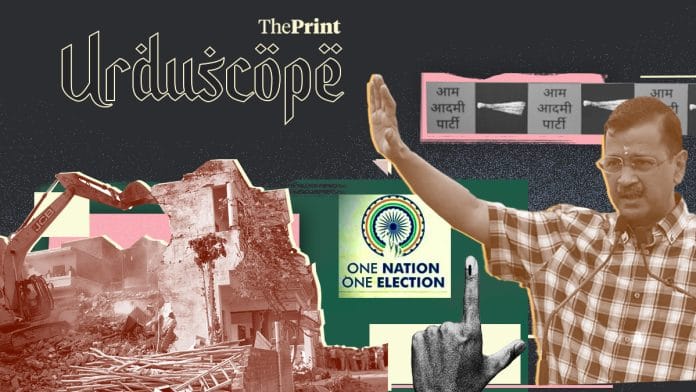New Delhi: Urdu newspapers—Inquilab, Siasat, and Roznama Rashtriya Sahara—criticised ‘one nation, one election’ as detrimental to India’s federal structure and harmful to democracy.
They also featured Arvind Kejriwal’s resignation from the post of Delhi Chief Minister on their front pages and in the editorials, holding central investigative agencies and the Bharatiya Janata Party (BJP) responsible for it.
They also suggested that Kejriwal’s resignation is likely part of his strategy to focus on the upcoming Haryana Assembly elections.
The newspapers welcomed the Supreme Court’s recent criticism of state authorities engaging in ‘bulldozer culture’ and its order halting any demolition without its permission until 1 October.
Additionally, Sahara strongly criticised Prime Minister Narendra Modi’s speeches against Rahul Gandhi, terming it “Rahul phobia”. The paper praised Gandhi for his efforts to promote unity and brotherhood, while fearlessly opposing the BJP’s policies.
Here’s a wrap of the news and editorials in the Urdu press this week.
Kejriwal’s resignation & its impact on Haryana polls
On 18 September, Sahara published an editorial criticising the BJP and the central investigative agencies for pressuring Arvind Kejriwal to resign as Delhi CM after being released on bail.
Accusing the Central Bureau of Investigation (CBI) and the Enforcement Directorate (ED) of lacking neutrality in states like Delhi, Jharkhand, Telangana, and West Bengal, the editorial said, “the parrot (CBI/ED) is not only still caged but also dances at its master’s command”.
Sahara questioned the basis of the allegations of money laundering in the Delhi liquor policy, emphasising that neither the CBI nor the ED had presented evidence despite multiple raids and investigations.
“The record shows that four to five liquor contractors arrested in the case had indeed paid electoral bonds to the BJP. However, instead of investigating this money laundering, the agencies continued to harass Arvind Kejriwal and other AAP (Aam Aadmi Party)’s leaders,” the newspaper wrote.
The editorial concluded that Kejriwal’s resignation could save Delhi from further complications, praising the nomination of Atishi as his potential successor.
On 18 September, Inquilab’s editorial said that the BJP’s strategy was to target Kejriwal’s AAP with corruption allegations to “marginalise” it. However, despite Kejriwal’s imprisonment, AAP has remained united—a strength the BJP likely underestimated.
Believing that the BJP did not try to lure AAP MLAs would be naive, but it appears that these efforts have failed, Inquilab’s editorial said, adding that, in a politically fragile environment like now, where members often switch sides during crises, AAP’s unity stands out.
Siasat, in its 18 September editorial, noted that Kejriwal’s move—his dramatic call for early election, taking the issue directly to the people—may have been a bid to gain sympathy votes in the Haryana elections. Despite the BJP’s unpopularity in the state, AAP and the Congress have not come together and this could potentially harm the Congress.
It re-emphasised its editorial from 16 September, when it said that Kejriwal may use corruption as a public issue to gain sympathy and political advantage in both Haryana and Delhi, adding that Kejriwal’s campaign could indirectly benefit the BJP. The long-term implications will only become clearer with time.
“Kejriwal’s move has surprised political circles, its long-term impact remains uncertain, and only time will reveal the full consequences of his strategy,” the Siasat editorial said.
On 14 September, Siasat’s editorial expressed concerns over the central investigative agencies, which, it said, are being perceived as politically biased. Agencies must conduct investigations impartially and professionally, the editorial said, ensuring that the guilty are punished and the innocent are not.
‘One nation, one election will impact public perception’
Siasat, in its 20 September editorial, said that holding simultaneous elections might reshape public perception, potentially sidelining regional issues, since India has a federal governance system and issues differ at the central and state levels.
It said that, before any decision is made, the opinions of all political parties should be considered, ensuring trust as well as the prioritisation of all perspectives, while avoiding imposition of decisions on individuals or institutions.
On 19 September, Sahara published an editorial that argued that the concept of ‘one nation, one election’ is fundamentally against India’s federal structure and harmful to its parliamentary democracy. The editorial highlighted that holding simultaneous elections for the Lok Sabha and state assemblies could extend or shorten the tenure of some legislatures, compromising state autonomy.
It emphasised that staggered elections ensure elected representatives are continuously accountable to the public. The imposition of synchronised elections would be an authoritarian move, curbing voters’ choices and transparency in governance. The editorial also stressed that this idea goes against constitutional provisions and could weaken democracy by favouring centralisation and diminishing local issues.
‘Rahul phobia’
Sahara published an editorial titled ‘BJP and Modi Busy in Rahul Phobia’, on 20 September, criticising Prime Minister Modi for repeatedly attacking Rahul Gandhi. It was referring to the Prime Minister saying Gandhi had a “Naxal mindset”, calling him the “Congress Virus,” and ridiculing his Bharat Jodo Yatra, ahead of the second phase of voting in Jammu and Kashmir.
The editorial praised Gandhi’s efforts to foster unity and challenge the BJP’s policies. “When the Prime Minister himself calls Rahul Gandhi a virus, it’s like inciting violence against him,” it concluded.
Bulldozer culture
On 16 September, Sahara welcomed the Supreme Court’s decision and criticised the “bulldozer culture” whereby state governments demolish the homes of accused individuals without following legal procedures. The editorial said the fact that now even the homes of family members of the accused were being bulldozed was a gross violation of the rule of law.
On 19 September, Siasat’s editorial said the Supreme Court’s order ensures accountability. Political figures should focus on building a positive reputation through public welfare policies, rather than negative politics, it said. The judiciary’s authority must be respected and governments should review and correct their actions following this ruling, the editorial added.
(Edited by Sanya Mathur)
Also Read: CJI hosting PM undermines separation of powers & compromises judiciary’s authority, says Urdu press






